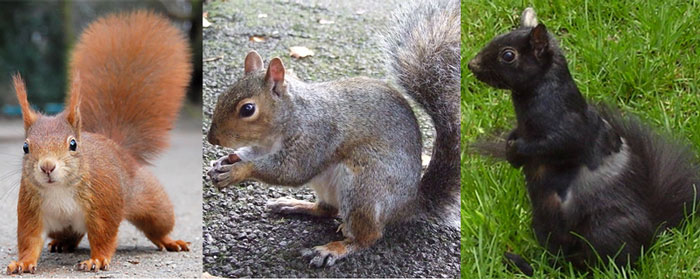Squirrel evolution?
This is the pre-publication version which was subsequently revised to appear in Creation 31(2):52–53, 2009.
The native red squirrel (Sciurus vulgaris) was once common throughout Britain. It was however pushed out of its native dwelling places to the edges of its habitat, to northern England and southern Scotland, when the eastern grey squirrel (Sciurus carolinensis) was introduced from America to England in the 1870s. Because the eastern grey is both larger and hardier than the red squirrel, it was able to out-compete the red squirrel and push it to the northernmost parts of its habitat range. It has been a cause for concern for many conservationists in Britain, who view the grey squirrel as an introduced pest.
Photos wikipedia

The order of succession in squirrel populations in Britain?
However, it now appears that the eastern grey is getting a taste of its own medicine from a new population that has emerged from its own ranks. In the last few decades, the numbers of black squirrels in England has been increasing greatly, and they have been dislodging the grey squirrels from their previous habitats.1
Dr Alison Thomas, a professor of life sciences from Anglia Ruskin University, Cambridge, who has been studying the ecology and genetics of England’s squirrel populations, said of the black squirrel:
‘There has been a recent population boom. They are due to overtake the grey squirrel population in some parts of the country.
‘The first sighting was in 1912, but sightings were very rare until the last few years. They were first spotted around Letchworth Garden City, near Royston, Hertfordshire—currently home to the UK’s largest colony.
‘But since then they have migrated northwards, penetrating Cambridge city boundaries in the 1990s. Now they make up 50 per cent of the squirrel population in the villages around Cambridge and they are spilling into Bedfordshire and Huntingdonshire.’
The black squirrels are apparently more vigorous than their grey cousins, and out-compete them for food and mates. Some sexual selection in favour of the black squirrels has also been suggested, as the females appear to prefer the black squirrels as mating partners.
Is this an example of ‘evolution in action’?
To qualify for that, it would for one thing have to result from an increase in genetic information producing the traits. However, the black squirrel condition is said to be the result of a mutation, since a strand of DNA is ‘missing’ in the blacks in comparison to the greys.
This mutation apparently results in increased melanin and testosterone production in the black squirrels, which would explain both the black squirrels’ colour and increased vigour.
One possible explanation for the increased testosterone resulting from a deletion of genetic information is that the black ‘mutants’ have lost (or have a reduced) ability to control testosterone and melanin production because of the deletion mutation. This obviously is a beneficial mutation, as it gives the black squirrels increased vigour. But the mutation would be a loss in control specificity; therefore, it is a loss in information and no overall help for evolution, which requires massive net increases overall in information (specified complexity) to cause microbes to turn into microbiologists and every other complex creature.
The Bible’s answer
Mutation and natural selection make sense within a biblical framework. Mutations are copying mistakes that occur in DNA as a result of the Fall. This results in a gradual but inevitable collapse of the genome because the vast majority of mutations are bad, but can’t be weeded out by natural selection.
There are a number of examples of beneficial mutations that result in a loss of information.2,3 But none of these help evolution because they’re the opposite of what molecules-to-man evolution requires: truckloads of mutations that are not only beneficial, but also increase the information content within the organism.
Natural selection occurs when an organism has a trait that enables it to survive and reproduce better than the rest of the population. This gives the trait a greater chance of surviving and thriving in a population, and may eventually take over that population, eliminating other traits that were less useful to the population.4
The episodes of the grey and black squirrels in England provide an excellent example of natural selection. They out-competed the previous populations of squirrels in the area, and thus got selected for. But such changes are perfectly consistent with the Bible, because they are a sorting or a loss of information, not a gain. Natural selection in and of itself results in the specialization of a population; it does not increase genetic information either.
References
- Derbyshire, D., The pack of mutant black squirrels that are giving Britain’s grey population a taste of their own medicine, Dailymail, 26 April 2008. Return to text.
- Wieland, C., Beetle bloopers, Creation 19(3):30, 1997. Return to text.
- Lamb, A., CCR5 delta32: a very beneficial mutation, Journal of Creation 20(1):15, 2006. Return to text.
- Wieland, C., Muddy waters, Creation 23(3):26–29, 2001. Return to text.

Readers’ comments
Comments are automatically closed 14 days after publication.